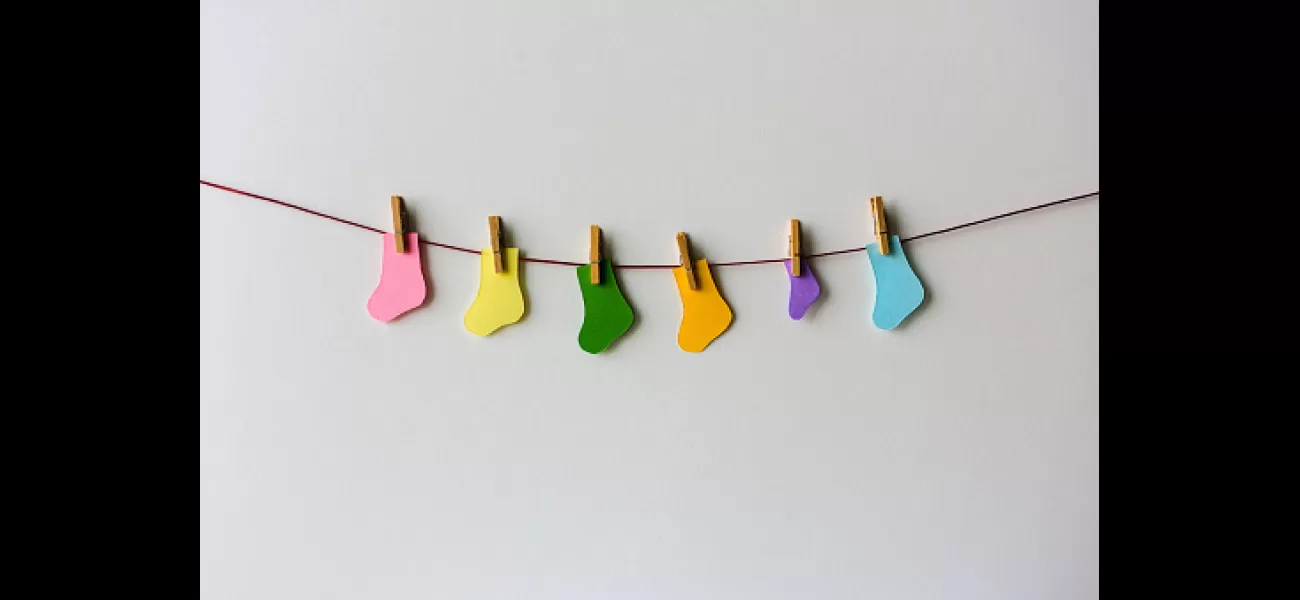Certificates for baby loss won't provide real comfort to grieving parents.
The UK Government introduced the policy this week.
February 23rd 2024.

It's a sad and unfortunate fact that 1 in 4 people will experience a miscarriage before reaching three months of pregnancy. Emma Garner knows this all too well, having tragically suffered through seven baby losses. As a 38-year-old from Manchester, she can't help but question whether a new government scheme to honor these lost babies is really enough for grieving parents.
The scheme states that families in England who have lost a baby before reaching 24 weeks of pregnancy are now eligible to apply for a baby loss certificate, officially recognizing their loss. However, there are some terms and conditions that come with this new policy. One of the main concerns is that there is a time limit for applications, meaning that families who have experienced loss before September 1st, 2018 are not eligible to apply.
Emma believes that having a baby loss certificate would have brought her some comfort during her intense grieving process. She shares that without it, she was left with nothing more than a sick note for two weeks. "I've even forgotten the dates of some of my miscarriages, so having something official to remember them by would be really nice," she tells The Agency. However, four of her seven losses occurred before 2018, leaving her wondering if those babies matter less or if she should be "over them" by now.
Even though she is able to apply for certificates for her losses after 2018, Emma has decided not to request any. "At the time, I would have appreciated this gesture, but it's something that should have happened in the moment," she explains.
Previously, any babies born still after 24 weeks of pregnancy were officially registered as stillbirths and received a certificate confirming their death. However, there has been no policy in place for those who lose a baby before this stage, leaving many parents without any official documentation of their child.
According to the UK's largest pregnancy and baby loss charity, Tommy's, one in four people will experience a miscarriage in the first three months of pregnancy. Emma's first loss occurred in 2014, when she got pregnant and an 8-week scan showed a healthy baby. But just two weeks later, there was no heartbeat and the baby had passed away. Emma had to undergo surgery to reduce her risk of infection.
In 2015, a year after her first loss, Emma experienced two more miscarriages. Later that year, she became pregnant again, and after a pregnancy filled with anxiety, she gave birth to her son, Henry. Despite all they had been through, Emma and her partner decided to try for another baby. Their second son, Thomas, was born with multiple health issues and sadly passed away at just six months old in April 2018.
After Thomas's death, Emma and her partner decided to try for a third child. She became pregnant again in 2018 but miscarried at 10 weeks. She went on to have three more early miscarriages that year. However, they ended the year on a positive note with the birth of their third son, George, in 2019 and their fourth son, Oliver, in 2021.
Sabina Dosani, a 49-year-old from Hertfordshire, has also experienced her fair share of loss. She has had three miscarriages and one chemical pregnancy, all occurring around the first trimester. She found out about two of them during routine scans and had to wait several days for a scan during the third loss. Sabina shares that she found the language used by medical professionals to be distressing and that her grief was not acknowledged. "As a medical doctor myself, this was a disorienting experience. I don't recall learning about miscarriage in medical school," she adds.
Sabina is relieved that parents in England can now apply for a baby loss certificate for pregnancies lost before 24 weeks. "Medicine is not good at recognizing this grief, so any form of recognition would have been a solace," she says. However, she has concerns about the details of the policy and worries that it may create a hierarchy of loss. She, like Emma, is ineligible for a certificate as her losses occurred before 2018.
While many are pleased with this new policy, some are worried that it may not be enough. In response to this, baby loss charity Sands is offering additional support for parents who do not qualify for the new scheme. Sands' chief executive, Clea Harmer, shares that they are still offering commemorative birth certificates for any bereaved parents in the UK and have a memorial book available for those in Scotland who have experienced pregnancy or baby loss before 24 weeks.
Tommy's chief executive, Kath Abrahams, believes that this new policy will bring a degree of comfort to families who have lost a baby before 24 weeks. "The pain of losing a baby before this stage is often made worse by the lack of formal recognition," she says.
For anyone seeking support after experiencing baby loss, organizations like the Miscarriage Association, Tommy's, and Sands are available to provide support and assistance. The pain of losing a child is something that no one should have to go through alone.
The scheme states that families in England who have lost a baby before reaching 24 weeks of pregnancy are now eligible to apply for a baby loss certificate, officially recognizing their loss. However, there are some terms and conditions that come with this new policy. One of the main concerns is that there is a time limit for applications, meaning that families who have experienced loss before September 1st, 2018 are not eligible to apply.
Emma believes that having a baby loss certificate would have brought her some comfort during her intense grieving process. She shares that without it, she was left with nothing more than a sick note for two weeks. "I've even forgotten the dates of some of my miscarriages, so having something official to remember them by would be really nice," she tells The Agency. However, four of her seven losses occurred before 2018, leaving her wondering if those babies matter less or if she should be "over them" by now.
Even though she is able to apply for certificates for her losses after 2018, Emma has decided not to request any. "At the time, I would have appreciated this gesture, but it's something that should have happened in the moment," she explains.
Previously, any babies born still after 24 weeks of pregnancy were officially registered as stillbirths and received a certificate confirming their death. However, there has been no policy in place for those who lose a baby before this stage, leaving many parents without any official documentation of their child.
According to the UK's largest pregnancy and baby loss charity, Tommy's, one in four people will experience a miscarriage in the first three months of pregnancy. Emma's first loss occurred in 2014, when she got pregnant and an 8-week scan showed a healthy baby. But just two weeks later, there was no heartbeat and the baby had passed away. Emma had to undergo surgery to reduce her risk of infection.
In 2015, a year after her first loss, Emma experienced two more miscarriages. Later that year, she became pregnant again, and after a pregnancy filled with anxiety, she gave birth to her son, Henry. Despite all they had been through, Emma and her partner decided to try for another baby. Their second son, Thomas, was born with multiple health issues and sadly passed away at just six months old in April 2018.
After Thomas's death, Emma and her partner decided to try for a third child. She became pregnant again in 2018 but miscarried at 10 weeks. She went on to have three more early miscarriages that year. However, they ended the year on a positive note with the birth of their third son, George, in 2019 and their fourth son, Oliver, in 2021.
Sabina Dosani, a 49-year-old from Hertfordshire, has also experienced her fair share of loss. She has had three miscarriages and one chemical pregnancy, all occurring around the first trimester. She found out about two of them during routine scans and had to wait several days for a scan during the third loss. Sabina shares that she found the language used by medical professionals to be distressing and that her grief was not acknowledged. "As a medical doctor myself, this was a disorienting experience. I don't recall learning about miscarriage in medical school," she adds.
Sabina is relieved that parents in England can now apply for a baby loss certificate for pregnancies lost before 24 weeks. "Medicine is not good at recognizing this grief, so any form of recognition would have been a solace," she says. However, she has concerns about the details of the policy and worries that it may create a hierarchy of loss. She, like Emma, is ineligible for a certificate as her losses occurred before 2018.
While many are pleased with this new policy, some are worried that it may not be enough. In response to this, baby loss charity Sands is offering additional support for parents who do not qualify for the new scheme. Sands' chief executive, Clea Harmer, shares that they are still offering commemorative birth certificates for any bereaved parents in the UK and have a memorial book available for those in Scotland who have experienced pregnancy or baby loss before 24 weeks.
Tommy's chief executive, Kath Abrahams, believes that this new policy will bring a degree of comfort to families who have lost a baby before 24 weeks. "The pain of losing a baby before this stage is often made worse by the lack of formal recognition," she says.
For anyone seeking support after experiencing baby loss, organizations like the Miscarriage Association, Tommy's, and Sands are available to provide support and assistance. The pain of losing a child is something that no one should have to go through alone.
[This article has been trending online recently and has been generated with AI. Your feed is customized.]
[Generative AI is experimental.]
0
0
Submit Comment





